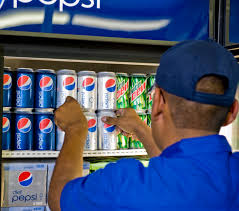PepsiCo (PEP +0.13%) recorded a strong first quarter to start off the year. Earnings per share came in at $0.79, exceeding consensus estimates of $0.75. That's a 14% increase over the same period last year, giving the company some breathing room as it battles activist investor Nelson Peltz, who is trying to break up the company.
PepsiCo's strong performance also gives it a much-needed confidence boost after having lagged Coca-Cola (KO +1.41%) throughout 2013. Here are the three top reasons why investors should be excited about PepsiCo's first-quarter results.
Reason No. 1: PepsiCo now competing with Coca-Cola
PepsiCo's beverage unit has underperformed relative to Coca-Cola for some time. In 2013, PepsiCo lost 40 basis points in U.S. carbonated-soft-drink market share, while Coca-Cola picked up the same amount. It also lagged Coca-Cola in liquid refreshment beverage share, losing 3.4 percentage points compared to Coca-Cola's 1.1 percentage point decline. Moreover, Coca-Cola announced lackluster first-quarter volume growth, including a sharp decline in soda volumes, so expectations were low heading into PepsiCo's quarterly report.
However, PepsiCo came through with a good quarter relative to Coca-Cola. Even though PepsiCo's global beverage volume was flat and Coca-Cola's increased 2%, the No. 2 American soft-drink company topped its competitor in the North American beverage market. North American beverages generate 30% of PepsiCo's revenue and 48% of Coca-Cola's. PepsiCo's North American beverage unit experienced flat volume growth and 1% organic revenue growth, while Coca-Cola's North American unit experienced flat volume and a 2% revenue decline.
Moreover, PepsiCo's carbonated-soft-drink volume in the Americas matched Coca-Cola's, with both experiencing a 1% decline. However, Coca-Cola edged out PepsiCo on non-carbonated beverage growth; its North American volume increased 3%, while PepsiCo's increased just 2%.
Turning around its North American beverage business is crucial to PepsiCo's ongoing prosperity. It appears that the beverage unit got back on track in the first quarter, a sign that things may be looking up for PepsiCo.
Reason No. 2: Higher prices, better mix
PepsiCo's North American beverage operations also impressed on pricing and product mix. Despite flat North American volume, PepsiCo increased revenue 2% by raising prices and stepping up advertising for higher-priced products.
Energy drinks, like PepsiCo's Mountain Dew Kickstart, retail for $1.99 per can, while a 12-pack of soda might cost just $3.50. In a phone interview with ABC News, CFO Hugh Johnston said the company's increased advertising has enabled the company to increase prices. He also said that PepsiCo intends to raise prices 2% to 3% across the board in 2014.
As soda consumption in the U.S. market -- which represents roughly 14% of PepsiCo's overall revenue -- continues to decline, the company must back its brands with heavy advertising to drive price increases across the board. PepsiCo's first-quarter results indicate that it has been able to do so thus far.
Reason No. 3: Encouraging full-year guidance
Management expects 2014 core constant currency earnings per share to increase 7% to $4.68. It also expects to return $12.4 billion to $13.7 billion to shareholders in dividends and share repurchases.
With a market capitalization of $130 billion, PepsiCo plans to return about 10% of the company's current market price in 2014 alone. That return of capital is enticing for any investor who believes that PepsiCo can continue its path back toward solid beverage growth.
Foolish takeaway
There is nothing earth-shattering about PepsiCo's first-quarter performance, but it was exactly what PepsiCo needed. The company is now performing in-line with Coca-Cola, even exceeding it in some cases, and is successfully growing revenue even as volume stagnates. Finally, PepsiCo is doing what any mature company with limited reinvestment opportunities should do: returning capital to shareholders. If every quarter looks as promising as this one, PepsiCo shareholders will enjoy outsized gains for a long time to come.







